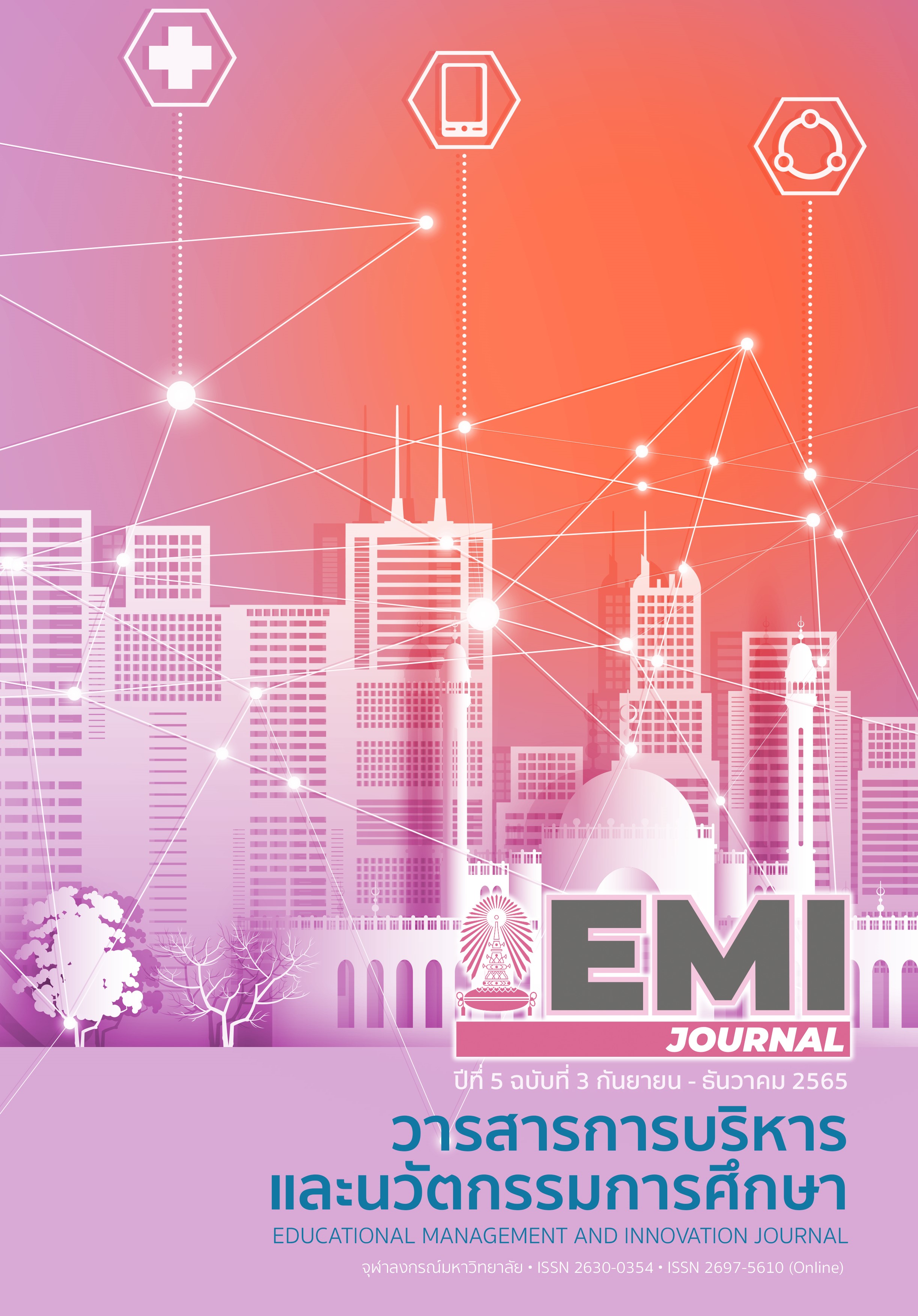ความต้องการจำเป็นในการบริหารวิชาการโรงเรียนมัธยมศึกษาในสังกัดสำนักงานเขตพื้นที่การศึกษามัธยมศึกษาสมุทรปราการ ตามแนวคิดผู้ออกแบบชีวิตที่มีคุณค่า
ความต้องการจำเป็นในการบริหารวิชาการโรงเรียนมัธยมศึกษาในสังกัด สำนักงานเขตพื้นที่การศึกษามัธยมศึกษาสมุทรปราการ ตามแนวคิดผู้ออกแบบชีวิตที่มีคุณค่า
คำสำคัญ:
การบริหารวิชาการ ผู้ออกแบบชีวิตที่มีคุณค่า โรงเรียนมัธยมศึกษา ความต้องการจำเป็นบทคัดย่อ
การวิจัยนี้มีวัตถุประสงค์เพื่อ ศึกษาความต้องการจำเป็นของการพัฒนาการบริหารวิชาการโรงเรียนมัธยมศึกษาในจังหวัดสมุทรปราการ ตามแนวคิดผู้ออกแบบชีวิตที่มีคุณค่า โดยใช้กรอบแนวคิดการบริหารวิชาการ และผู้ออกแบบชีวิตที่มีคุณค่า การวิจัยครั้งนี้ใช้วิธีการวิจัยเชิงบรรยาย ประชากรที่ใช้ในการวิจัย โรงเรียนมัธยมศึกษาสังกัดสำนักงานเขตพื้นที่การศึกษามัธยมศึกษาสมุทรปราการ จำนวน 25 โรงเรียน ผู้ให้ข้อมูล คือ ผู้อำนวยการสถานศึกษา รองผู้อำนวยการสถานศึกษา หัวหน้ากลุ่มสาระการเรียนรู้ และครูผู้สอน จำนวน 326 คน เครื่องมือที่ใช้ในการวิจัย คือ แบบสอบถามความต้องการจำเป็นของการพัฒนาการบริหารวิชาการโรงเรียนมัธยมศึกษาในจังหวัดสมุทรปราการ ตามแนวคิดผู้ออกแบบชีวิตที่มีคุณค่า ที่มีค่าความเชื่อมั่นเท่ากับ 0.978 สถิติที่ใช้ในการวิเคราะห์ข้อมูล คือ ความถี่ ร้อยละ ค่าเฉลี่ย ส่วนเบี่ยงเบนมาตรฐาน และการวิเคราะห์ความต้องการจำเป็น (PNIModified)
ผลการวิจัยพบว่า ความต้องการจำเป็นของการพัฒนาการบริหารวิชาการโรงเรียนมัธยมศึกษาในจังหวัดสมุทรปราการ ตามแนวคิดผู้ออกแบบชีวิตที่มีคุณค่า ในภาพรวม คือ 0.378 (PNIModified = 0.378) เมื่อวิเคราะห์ความต้องการจำเป็นรายด้าน พบว่า ด้านการจัดการเรียนรู้ มีความต้องการจำเป็นมากที่สุด (PNIModified = 0.385) รองลงมา คือ ด้านการพัฒนาหลักสูตร (PNIModified = 0.377) และด้านการประเมินผลมีค่าความต้องการจำเป็นน้อยที่สุด (PNIModified = 0.371) ตามลำดับ เมื่อพิจารณาตามผู้ออกแบบชีวิตที่มีคุณค่า รายข้อย่อยที่มีความต้องการจำเป็นสูงสุดเหมือนกันทั้ง 3 ด้านของการบริหารวิชาการ คือ การวางแผนเส้นทางเพื่อไปสู่การได้ทำในสิ่งที่รักได้ดีอย่างมืออาชีพ (Profession)
ทั้งนี้ โรงเรียนสามารถนำผลการวิจัยไปใช้วางแผนแนวทางการบริหารวิชาการ เพื่อให้มีการพัฒนาหลักสูตร การจัดการเรียนรู้ และการประเมินผล ที่ส่งเสริมให้ผู้เรียนเป็นผู้ออกแบบชีวิตที่มีคุณค่า
Downloads
เอกสารอ้างอิง
Boonprasert, U. (1997). Curriculum and School Academic Administration. Bangkok: Samcharoen Panich (Bangkok). [in Thai]
Buathong, S. (2017). Measurement and Assessment of Learning Skills in the 21st Century. Veridian E-Journal, Silpakorn University Humanities, Social Sciences, and Arts, 10(2), 1856-1867. [in Thai]
Bureau of the Budget. (n.d). Thailand’s Budget in Brief Fiscal Year 2017. Bangkok: P.A. Living.
Cannon, A. J., Sobie, S. R., & Murdock, T. Q. (2015). Bias correction of GCM precipitation by quantile mapping: how well do methods preserve changes in quantiles and extremes? J. Clim. 28, 6938-6959.
Chaemchoy, S. (2022). Academic Management Responsive to change in the Disruptive Era. Bangkok: Chulalongkorn University Press. [in Thai]
Chaemchoy, S. et al. (2022). Policy Design for Transforming Learning Syatems Responsive to Future Global Changes in 2040. Kasetsart Journal of Social Sciences, 43(2), 509-516.
Chiu, L., Emblen, J. D., Van Hofwegen, L., Sawatzky, R., & Meyerhoff, H. (2004). An integrative review of the concept of spirituality in the health sciences. Western journal of nursing research, 26(4), 405-428.
Clegg, G., & Barrow, C. (1984). How to Start and Run Your Own Business. London: Macmillan Press.
Crumbaugh, J. C. (1977). The Seeking of Noetic Goals Test (SONG): A complimentary scale to the Purpose in Life Test (PIL). Journal of Clinical Psychology, 33(3), 907-910.
Cortina, L. (2011). School administrators and the professional learning of general education teachers related to gifted education. A Delphi study. Seton Hall University Dissertations and Theses (ETDs), Paper (1421).
English, F. W. (2000). Deciding What to Teach and Test: Developing, Aligning, and Auditing the Curriculum. Newbury Park, CA: Corwin Press.
Erawan, P. (2019). A Synthesis of Systems and Approaches to Reforming the Teacher Professional Development: Transforming Conceptions of Professional Learning to Practices. Silpakorn Educational Research Journal, 11(2), 160-178. [in Thai]
Equitable Education Fund. (2021). EEF Annual Report 2020. Bangkok: Equitable Education Fund. [in Thai]
Innovation Foresight Institute. (2021). Innovation Foresight Institute Annual Report 2020. Bangkok: Innovation Foresight Institute. [in Thai]
John W. Best. (1981). Research in Education (4th ed.). New Jersey: Prentice-Hall.
Kanjanawasee, S. (2013). Traditional test theory (7th ed.). Bangkok: Chulalongkorn University Printing House. [in Thai]
Ketchatturat, J. (2017). Methods and Learning Evaluation Toolki. Khon Kaen: kkuprinting. [in Thai]
Khonyu, W. (2012). Curriculum development following the current situation. Retrieved from http://km.npru.ac.th/userfiles/R014/km_articles_files/20130813162821_KM- The Development of Curriculum according to present situation 202.pdf [in Thai]
Krejcie, R. V., & Morgan, D. W. (1970). Determining sample size for research activities. Educational and psychological measurement, 30(3), 607-610.
Marland, S. P. (1971). “Career education now” Speech delivered before the Convention of the National Association of Secondary School Principals. Houston, Texas.
Office of the Education Council. (2020). Thai education status 2018/2019 Education Refrom in the Digital Era. Bangkok: Pabpim Printing House. [in Thai]
Panit, W. (2014). Learning paths for students in the 21st century. Bangkok: SotSri-Saritwong Foundation. [in Thai]
Pukiat, L. (2001). Project Learning: Principles and Guidelines for the event. Bangkok: Chulalongkorn University. [in Thai]
Puprasert, K. (2005). Academic Management in School (2nd ed.). Bangkok: Medhitips. [in Thai]
Rodrakam, S. (2018). The role of school administrators in Thailand 4.0. Graduate School Conference 2018 of Suan Sunandha Rajabhat University Research Proceeding, 1(2), 575-579. [in Thai]
Suwathanpornkul, I. (2011). A proposed alternative strategies for school management to develop student’s life skills based on the philosophy of sufficiency economy and career education approach using knowledge management process [Unpublished manuscript]. Department of Educational Research and Psychology, Faculty of Education, Chulalongkorn University. [in Thai]
Thailand Management Association. (2021). TMA Annual Report 2020. Bangkok: Thailand Management Association. [in Thai]
Tharasrisutti, P. (2007). Leadership and Ethics for School Administrators. Bangkok: Ramkhamhaeng University. [in Thai]
The Secondary Educational Service Area Office Samut Prakan. (2020). Action Plan 2021. Samut Prakan: The Secondary Educational Service Area Office Samut Prakan. [in Thai]
The Secondary Educational Service Area Office Samut Prakan. (2021). The governmental operationalplan for the fiscal year 2022. Samut Prakan: The Secondary Educational Service Area Office Samut Prakan. [in Thai]
Thompson, G. (2013). Aligning curriculum, instruction, and assessment. Retrieved January 12, 2022, from https://prezi.com/xew2nz2dj0sp/aligning-curriculum-instruction-and-assessment/
Vehachart, R. (2017). Academic Management in Basic Education Institution. Songkhla: TSU Bookshelf. [in Thai]
Wonganutararoj, P. (2010). Academic Management. Bangkok: Bangkok Bethailand.
[in Thai]
Wongwanich, S. (2015). Needs assessment research (3rd ed.). Bangkok: Chulalongkorn University Printing House. [in Thai]
ดาวน์โหลด
เผยแพร่แล้ว
ฉบับ
ประเภทบทความ
สัญญาอนุญาต
ลิขสิทธิ์ (c) 2022 วารสารการบริหารและนวัตกรรมการศึกษา

อนุญาตภายใต้เงื่อนไข Creative Commons Attribution-NonCommercial-NoDerivatives 4.0 International License.



